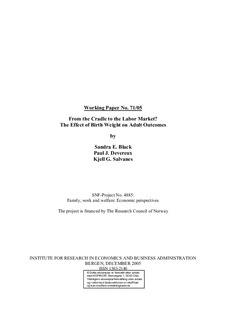| dc.description.abstract | Lower birth weight babies have worse outcomes, both short-run in terms of one-year mortality rates and longer run in terms of educational attainment and earnings. However, recent research has called into question whether birth weight itself is important or whether it simply reflects other hard-to-measure characteristics. By applying within twin techniques using a unique dataset from Norway, we examine both short-run and long-run outcomes for the same cohorts. We find that birth weight does matter; very small short-run fixed effect estimates can be misleading because longer-run effects on outcomes such as height, IQ, earnings, and education are significant and similar in magnitude to OLS estimates. Our estimates suggest that eliminating birth weight differences between socio-economic groups would have sizeable effects on the later outcomes of children from poorer families. | en |
